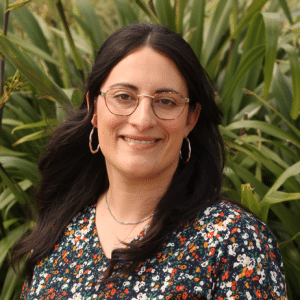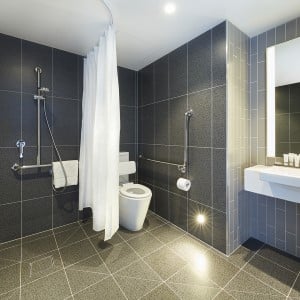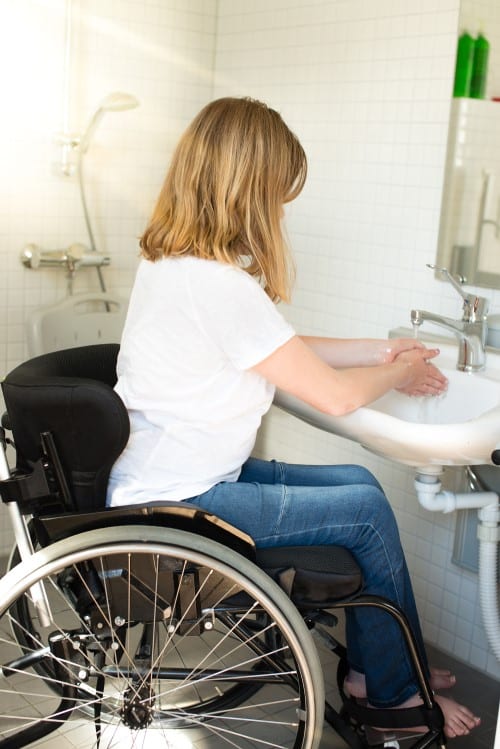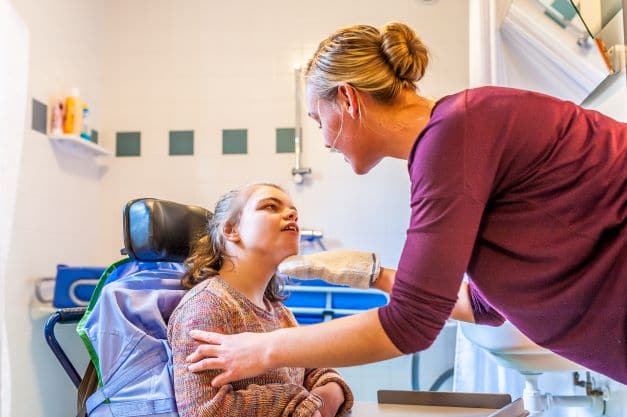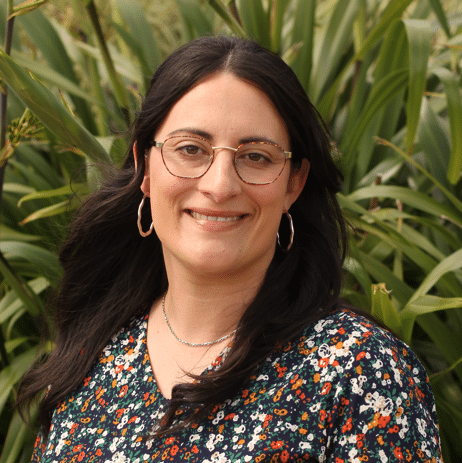MediStays’ individualised approach to accommodation with accessible bathrooms
Patients living with a physical disability, who are frail, or have undergone an operation often require accommodation with accessible bathrooms that support physical accessibility.
At MediStays, we firmly believe that safe and and accessible bathrooms, including toilet and shower facilities is a foundational human right.
Unfortunately, accessible bathroom designs are not the norm in Australia. For people with specific access needs, standard designs of toilets, showers and basins are often not fit-for-purpose.
Accessible bathrooms make it easier for both loved ones and formal carers (such as visiting nursing staff) to assist with hygiene routines.
Whereas, standard (non-accessible) bathrooms need extra time, equipment and support people in order to be used safely.
This is an added burden to patients and their carers in multiple ways, especially when travelling long distances from rural and regional Australia.
We spoke to Laura Simmons, a passionate occupational therapist as well as the CEO and Founder of Theratrak, an app supporting allied health professionals and their clients’ therapy.
Laura works with families who have children living with a range of disabilities, providing them with early intervention treatments. In regards to how travel can exacerbate existing disability needs, Laura said:
“Travel means you are not in your home environment. It adds to the learning load for a person.
They have to remember where certain things are, how different taps work or if there are different ‘tricks’ they use in their bathroom that help them to access the environment easier.
People may also have additional stresses when they are travelling, away from regular carers or just be in a different mental health state because they aren’t at home”.
Due to accessible bathrooms not being the norm, it is difficult for mobility impaired people to find both regular and medical accommodation that meets their needs. This creates additional strain on planning and logistics purely to find accommodation that meets basic accessibility requirements.
Which MediStays guests may require accommodation with accessible bathrooms?
Many guests booking with MediStays have some level of accessibility requirements. This can include the following groups:
✓ Rural and regional Australians: can need an accessible place to stay while in the city for hospital treatment.
✓ Recently discharged patients: may need a period of enhanced access as they transition from hospital to MediStays accommodation before returning home.
✓ New or existing physical disability: will need their accessibility needs met when they require a medical stay or when booking NDIS funded short and medium term accommodation.
Physical considerations can include:
- Reduced mobility due to an operation
- Elderly people with difficulty standing and walking
- People frail due to chronic conditions or injury
- Wheelchair users and those with limited physical ability
- Physical challenges exacerbated by geographical distance
Height adjusted vanities for independent wheelchair users
What does ‘accessibility requirements’ mean?
For people who’ve never experienced a period of limited mobility, it can be difficult to understand what accessible bathroom requirements are needed. At MediStays we work with qualified Occupational Therapists, alongside client requests and feedback. Together, we focus on the most impactful accessibility features for our accommodation options.
Laura Simmons, occupational therapist and CEO and Founder of Theratrak, feels one of the key features overlooked when creating truly accessible accommodation is familiarity. This goes beyond just wheelchair accessible facilities.
She lists key strategies such as “making the bathroom feel as familiar as possible, and keeping the design simple but pleasing. Making the bathroom not feel like a hospital so that it is still an enjoyable experience. Making sure the person feels safe and feels like they can still have their dignity and privacy whilst accessing the bathroom even if they do need support.” All of these can benefit the guest’s daily activities and provide an overall more comfortable and enjoyable experience.
Laura encourages that every effort towards more accessible bathrooms may even reduce the risk of falls and injury to a guest – which is always an amazing outcome!
Wheelchair Access
First, let’s imagine from the perspective of a person using a wheelchair. Of course they want to be able to reach everything they plan to use. Meaning, everything is comfortable to reach in a seated position – rather than standing.
Generous circulation space when carers assist with daily care needs.
Wheelchair-accessible bathrooms have:
- Wheel-in access and manoeuverability
- Ergonomically placed handrails
- Circulation space for carers and support people to assist
- Height-adjusted vanities
The chair and it’s wheels are wider than the user’s body. So, doorways and pathways need to accommodate the wheelchair comfortably. Especially for a guest’s arms when using a manual chair.
Hospital Discharge:
An important consideration for accessible bathroom features is for patients who have undergone an operation, and booked discharge accommodation for their recovery.
These types of patients can:
- Be in a lot of pain
- Feel very weak or tired
- Need dressings changed regularly
- Have challenges with eating and drinking
- Be adjusting to high levels of pain medication
Recently discharged patients may be temporarily in a wheelchair, so accessibility needs can overlap with those of guests living with permanent physical disabilities. They will likely need support showering, getting dressed, using the toilet and getting in and out of bed. Support people will need logistical space to assist patients with these tasks.
MediStays is designed for hospital discharge situations, which are becoming more and more important as we create hospital alternative accommodation. It can save people from being admitted to hospital, or enable them to leave when ready.
For this reason, MediStays identify and work closely with providers of accessible accommodation for hospital discharge guests. Upholding accessible care includes having enough of a resource for all of those needing to access it.
Older Australians:
Whatever the reason an older person may be receiving medical or health treatment, accessibility requirements generally increase as we get older.
They may also be in a wheelchair or need to use a walker or cane. However, many older people are still able to use the toilet unassisted as long as there are specific accessibility features in place. This can include correct handrail placements and space to fit walkers next to the toilet.
Despite diverse situations, these questions can help:
- Do they experience memory, physical or cognitive impairments?
- Do they require support to walk?
- Are they healing from a physical treatment, injury or ailment?
- Do they experience side effects from any medications?
- What is the key aim of their medical stay?
Universally, there are several core features that are applicable to most situations of accessibility needs.
MediStays offers three key categories for accessible design:
| ACCESS 1 | Often for frail and elderly guests, especially following a hospital discharge. Includes:
|
| ACCESS 2 | Generally for someone with access needs and staying independently.
Includes:
|
| ACCESS 3 | Designed to be fully wheelchair accessible while also staying with carers. Includes:
|
MediStays is proud to offer a comprehensive range of accommodation for Access 1, a great selection for Access 3, and good options across all states for Access 2.
MediStays is continually committed to our mission to provide accessible accommodation that supports people on a health journey. To ensure this, we are working with new accommodation providers to add more Access 2 properties in the future. If you wish to understand accessible properties in more detail, you can view the Australian building code for accessibility here [AS 1428.1-2001].
For the focus of this blog post, we are going to look at MediStays’ offering for accessible bathroom features.
Some things to consider when requesting medical accommodation:
❑ Could the guest step over the height of the shower lip easily?
❑ Would handrails or grip rails in the toilet and shower improve safety?
❑ Do vanities need to be height-adjusted to allow a wheelchair to roll under?
Accessible bathrooms with MediStays: three key criteria for showers
Accessible bathrooms are an important and fundamental option for medical accommodation, and all accommodation options. Unfortunately, the majority of bathrooms in Australia are standard designs.
Thankfully, MediStays has options for all levels of accessibility needs:
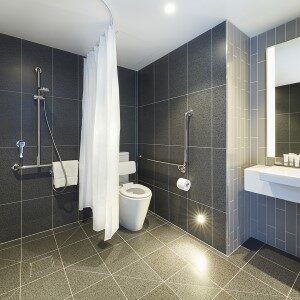 |
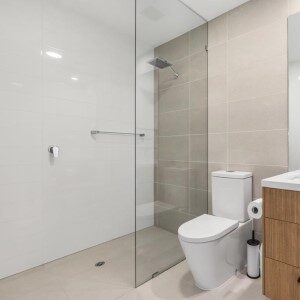 |
| Roll-in shower
Spacious roll-in room with no shower screen
|
Walk-in shower
Shower integrated with floor tiles
|
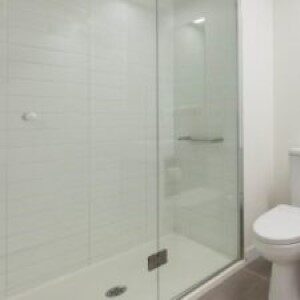 |
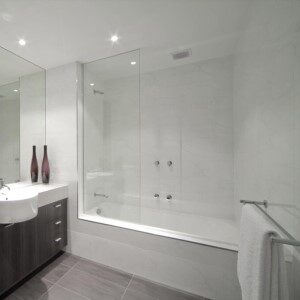 |
| Standard shower
Shower with a raised lip or base
|
*Shower over bath (extra category)
Shower is integrated in bath
|
We also offer the option of Occupational Therapist assessments to ensure bathroom modifications are correct for our guests’ needs.
Meeting accessibility requirements: beyond ‘the bare minimum’
MediStays prides itself on meeting the individualised accessibility needs of patients. Our goal is to deliver the most comfortable, safe and efficient experience possible. Not only does this include the facilities, but also our support and facilitation of guests’ booking process.
MediStays integrates accessibility requirements requested by guests into the assessment and accommodation selection process.
Hospital discharge:
We also manage a lot of bookings for hospital discharge. This category of stays often have very high needs for safety, accessibility and comfort. So it’s absolutely essential to the MediStays team that we get these requirements right – from referral to arriving back home.
To keep our standard of care at the highest level, we often arrange for a qualified Occupational Therapist to conduct an onsite property inspection.
Their specialist qualifications and assessment focuses specifically on the needs of individual guests being discharged.
Overall, Laura Simmons, occupational therapist and CEO and Founder of Theratrak, says that “every patient is always so different when it comes to bathroom access. We need to think about their mobility and cognitive abilities first. Making sure the person feels safe and feels like they can still have their dignity and privacy whilst accessing the bathroom even if they do need support”.
Laura believes that having accessible bathrooms during medical travel can result in “creating a positive experience in a place where people can feel at their most vulnerable, which provides dignity and respect back to that person. Giving them the opportunity to feel independent in a place that might not always be the easiest experience may give them confidence and improve the outcome of what might be a stressful situation”.
MediStays is adaptable in the choices we offer. Shower and toilet chairs are ready to go at most accommodation options (when required).
For hospital discharge requirements, we can convert fully accessible properties (Access 3) into hospital equivalents.
Here’s how MediStays does this:
Step 1: We work with the guest and/or their extended team of referrers, OT, nursing and social work staff to assess their individual requirements
Step 2: Using these criteria, we recommend the most suitable fully accessible properties (Access 3).
Step 3: Once the property has been selected, we store the standard furniture.
Step 4: We bring in assistive technology, including a specialised bed and mattress, hoist, commode and/or shower trolley
Step 5: Following guest arrival, MediStays is the central contact for all parties ensuring that the guest and carers are supported during their stay.
In many cases, the use of a shower hoist ensures the patient can be moved comfortably and safely for bathing. For patients that can only lie horizontally or are connected to equipment, the shower trolley will be used instead of the hoist.
For guests requiring this level of care during their stay, our MediStays team ensures the property design supports the needs of the guest. This of course includes supporting their extended care team of family and professional carers for the best overall experience.
All of this individualised care wouldn’t be possible without MediStays’ wonderful Care Navigators. To find out more about their services and how they can support rural and regional Australians to find the best accessible accommodation for hospital discharge remotely, see our Resources page.
